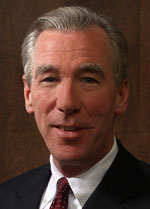This month we took a vacation with all of our children and grandchildren. We stayed at a cottage my parents bought 50 years ago. There were quite a few aunts, uncles and cousins nearby.
My wife and I talked with my brothers and sisters about how unconcerned our parents had seemed during the summers we spent there. Mother would turn us out of the house when the fog was still rising off the bay, and we’d be gone for hours. She had a bell she would ring when it was time for lunch or dinner. We were usually within its range but sometimes not. The only strict rule was no swimming without an adult.
You may not be surprised to learn that our children don’t do this with their little ones. Like many in their generation, they worry about their children being out of sight. Supervision of children’s play has become an additional weighty item on the list of parental duties.
Why? Is the world more dangerous than it was two generations ago? Do our children love their children more than our parents loved us? Are there more bad people out there or greater environmental hazards? I’m inclined to think none of these things is true. But how else do you explain the shift in parental attitudes and the rise of “helicopter parents” hovering over their broods?
Parents today leave little to chance. Four-year-olds have play dates arranged, and they are strictly supervised. Children must wear bicycle helmets and (by law) ride in car seats until grade school. Gone are the informal pickup games of baseball and soccer where children gathered and chose sides. Children play in organized leagues, with coaches and uniforms on well-kept fields with referees. Perhaps the change is related to the decline in family size. I was one of 8 children, and many of my childhood friends came from big families. In the summer, when our parents sent us outdoors, we played in groups large enough for a baseball game. When my brothers went crayfish hunting in the creek, they would go together. If someone got into trouble, others were nearby to help or sound the alarm.
Maybe there aren’t enough children around for us to turn them loose in groups. The National Center for Health Statistics reported this summer that the fertility rate in the United States is 1.89 children per woman.
With their choices to marry later and hover over their children, I sometimes wonder whether young adults today aren’t reacting (perhaps overreacting) to the older generation’s bad habits. Even those Gen-Xers who had happy childhoods are reminded often by movies and television and popular literature of the career-driven or selfish family neglect in which some baby boomers indulged.
It’s good that parents are more involved in their children’s lives. Children are probably safer, but surely there are drawbacks. Overwatched children may develop an even longer-lasting sense of self-importance from being doted on so long. Will they grow up to be big 2-year-olds? Are we setting them up for an adulthood filled with the characteristic vices of the overpampered — the self-pitying tantrums and drug addictions of today’s celebrities? Overparenting may just leave children less prepared to meet the responsibilities of adulthood on their own.
It’s a tough balance to find: providing the necessary parental care and giving children room to breathe and grow. I’m not sure our parents had it right. I’m not sure our children do either. I’d like to say that we ourselves did, but I have become more open-minded with age.
***
Garvey is president of The Catholic University of America in Washington.
PREVIOUS: Achieving quality jobs and fair compensation
NEXT: Sing a prayer of thanks for busy cantors’ service



Good article, well thought out. As more and more millennials populate corporate America, I’m seeing more and more “big 2 year olds”.